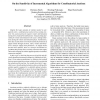Free Online Productivity Tools
i2Speak
i2Symbol
i2OCR
iTex2Img
iWeb2Print
iWeb2Shot
i2Type
iPdf2Split
iPdf2Merge
i2Bopomofo
i2Arabic
i2Style
i2Image
i2PDF
iLatex2Rtf
Sci2ools
123
click to vote
WECWIS
2002
IEEE
2002
IEEE
On the Sensitivity of Incremental Algorithms for Combinatorial Auctions
Despite the large amounts of runtime needed to adequately solve a combinatorial auction (CA), existing iterative CA auction protocols require winner determination during every round of bid submissions. Using existing algorithms for winner determination will cause a timing bottleneck during the winner determination phase. Furthermore, there has recently been work which models the formation of supply chains through auctions. Here, winner determination is used for supply chain formation. As supply chains become more dynamic, there is a need for incremental algorithms that quickly and accurately restructure the supply chain while keeping the initial supplier/producer/consumer constraints satisfied. In this work, we look into the process of quickly and efficiently handling incremental changes in combinatorial auctions. Given some perturbations, we illustrate the tradeoff between preserving the previous solution while maximizing the valuation of the auction. Our results show that it is po...
Related Content
| Added | 16 Jul 2010 |
| Updated | 16 Jul 2010 |
| Type | Conference |
| Year | 2002 |
| Where | WECWIS |
| Authors | Ryan Kastner, Christina Hsieh, Miodrag Potkonjak, Majid Sarrafzadeh |
Comments (0)

